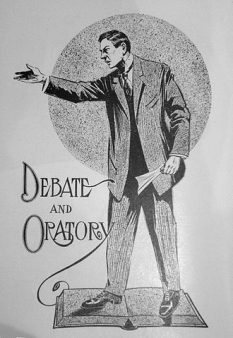Arguing Virtuously
14 August 2017
I recently found out that I had been collecting books by accident. Rearranging some shelves, I discovered I had several books with similar titles, all acquired at different times, and for different reasons, but with a strikingly similar theme: Winning Arguments; How to Win An Argument; How to Win Every Argument; The Art of Always Being Right; and Winning with Deception and Bluff. Publishers, I thought, must be convinced that winning arguments is something many people value—and value enough to pay for a book that promises to tell them how.
This conclusion was somewhat weakened by a browse through the outwardly most ruthless of these works, Winning with Deception and Bluff, where I found a section entitled “Never Win An Argument”:
“So you win the argument. You’ve silenced the other. What exactly have you won? You’ve exposed an error or fallacy in the other’s thinking, compelled him to change an opinion or attitude he may have nurtured for a long time. That’s never pleasant. He may respect you more, but he’ll like you less. True, you’re one up, but strategically you’re one down.”
The author’s ruthless streak comes out in the next sentence: “What did you lose? The rapport necessary to put over whatever manipulative maneuver you had in mind.” But whatever the motive, there’s something right here. All too often, the experience of losing an argument is an unpleasant one. If we rely on arguments to change people’s minds, that’s a problem, because giving people unpleasant experiences doesn’t seem too likely to make them agree with us. (Or to win over bystanders, for that matter.)
What can we do to remedy this problem? For the last decade or so, I have been one of several people making the case for a virtue theory of argumentation. Virtue theories and argumentation are as old as philosophy itself, if not older, but the explicit application of the former to the latter is a much more recent development. Most philosophical studies of argument adopt the same perspective as my accidental book collection. They emphasize technical aspects of argument success or failure, but they pay much less attention to the broader context of arguing, and generally ignore how the character of the people who take part in arguments bears on that success or failure. Virtue theories of argument seek to redress the balance, shifting the perspective away from arguments as products and onto arguers as people.
One way to explore the character of arguers is to look at their virtues and vices. Many instances of the traditional fallacies that logicians and argumentation theorists have been discussing since Aristotle can be analysed in terms of the vices of the arguer who employs them (or the audience that falls for them). But arguers can exhibit other vices that lead arguments to malfunction in other ways. Some of these vices may correspond pretty closely to those familiar from ethical contexts: we may be cowardly in not defending a position we believe to be right, contemptuous of our opponent, or unfair in how we present an opposing position. Other vices may be unique to argumentation, such as unwillingness to revise our own position or unwillingness to engage in argument in the first place. A fuller inventory of the vices of argument promises to help explain how even the arguments that succeed by traditional lights can seem so unsatisfactory. Conversely, cultivation of the corresponding virtues of argument should improve the conduct and outcome of our arguments.
If I’m right, then what the books in my collection miss is that winning arguments is seldom good enough. If we can win virtuously, then we have a chance of finding lasting and mutually acceptable resolutions to our disputes. If we just try to win arguments by whatever means necessary, we shouldn’t be surprised if our temporary resolutions rapidly fall apart in acrimony.
Image is “Debate and Oratory”. Image for first page of “Debate and Oratory” section of 1909 Tyee (yearbook of the University of Washington) unsigned but attributed to Olaf E. Caskin [Public domain], via Wikimedia Commons
- October 2024
- September 2024
- August 2024
- July 2024
- June 2024
- May 2024
- April 2024
- March 2024
- February 2024
- January 2024
- December 2023
- November 2023
- October 2023
- September 2023
- August 2023
- July 2023
- June 2023
- May 2023
- April 2023
- March 2023
- February 2023
- January 2023
- December 2022
- November 2022
- October 2022
- September 2022
- August 2022
- July 2022
- June 2022
- May 2022
- April 2022
- March 2022
- February 2022
- January 2022
- December 2021
- November 2021
- October 2021
- September 2021
- August 2021
- July 2021
- June 2021
- May 2021
- April 2021
- March 2021
- February 2021
- January 2021
- December 2020
- November 2020
- October 2020
- September 2020
- August 2020
- July 2020
- June 2020
- May 2020
- April 2020
- March 2020
- February 2020
- January 2020
- December 2019
- November 2019
- October 2019
- September 2019
- August 2019
- July 2019
- June 2019
- May 2019
- April 2019
- March 2019
- February 2019
- January 2019
- December 2018
- November 2018
- October 2018
- September 2018
- August 2018
- July 2018
- June 2018
- May 2018
- April 2018
- March 2018
- February 2018
- January 2018
- December 2017
- November 2017
- October 2017
- September 2017
- August 2017
- July 2017
- June 2017
- May 2017

